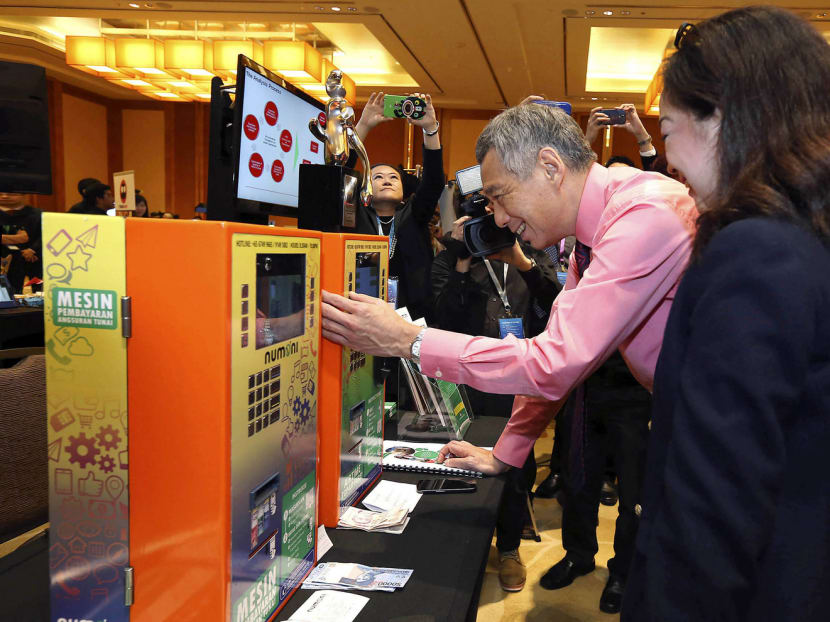S’pore must exploit IT advantage to stay ahead: PM
SINGAPORE — To compete against other leading cities such as New York, London and Shanghai, the Republic has to fully exploit its advantage in information technology and become a “Smart Nation”, Prime Minister Lee Hsien Loong said yesterday as he laid out the vision for Singapore to become a nation “whose people live meaningful and fulfilled lives, enabled seamlessly by technology, offering exciting opportunities for all”.

Prime Minister Lee Hsien Loong visiting Numoni’s booth during an exhibition held at the National Infocomm Awards. Numoni was the winner for the category of Most Innovative Infocomm Product/Solution. PHOTO: Ministry of Communications and Information
SINGAPORE — To compete against other leading cities such as New York, London and Shanghai, the Republic has to fully exploit its advantage in information technology and become a “Smart Nation”, Prime Minister Lee Hsien Loong said yesterday as he laid out the vision for Singapore to become a nation “whose people live meaningful and fulfilled lives, enabled seamlessly by technology, offering exciting opportunities for all”.
But to make the quantum leap and realise the vision within the next decade, efforts are needed in areas such as beefing up cybersecurity and teaching students how to create the technology of the future, said Mr Lee, who first announced the Smart Nation initiative during the National Day Rally in August.
Singapore must also systematically “integrate all of the technology and the possibilities into a coherent and comprehensive whole”, as opposed to using technology in a piecemeal fashion — which it is already doing. To that end, a new Smart Nation Programme Office will be set up under the Prime Minister’s Office to coordinate the Government agencies, citizens and industries to ensure a “whole-of-government, whole-of-nation” approach.
It will aim to bring citizens, the Government and industry together to identify issues, prototype ideas and deploy them effectively. The office will report to Minister for the Environment and Water Resources Vivian Balakrishnan, said Mr Lee, adding that he would take a “personal interest”.
Speaking at the National Infocomm Awards and the launch of the Smart Nation initiative yesterday, Mr Lee said the Government will lay the foundation by building infrastructure and facilitating innovation.
On their part, companies should seize opportunities to provide a service or a product that enhances the people’s lives. Citizens can also chip in by participating in the national effort and providing local knowledge and data.
He noted that with the tonnes of information and data put into computer networks and even smartphones, cybersecurity is crucial. “We take it seriously, we already have cybersecurity duties presiding in the Ministry of Home Affairs and the Infocomm Development Authority (IDA), but I don’t think that they are as strong as we would like them to be and we need to reorganise that to strengthen our systems and our institutions. We are studying how best to do that,” he said.
He added that Government systems as well as other critical systems such as in telecoms, banking and energy need to be protected. “You will never be completely impregnable, but I think we need to be as secure and safe as we can be.”
In terms of education, he said that students should be taught to “code, prototype and build things, to fail fast and learn quickly”.
He added: “We must get our children exposed to IT (and) exposed to programming. It’s a long way for us, but in some countries, all kids are required to learn to code.” People also need to have a “can-do” spirit of experimentation and risk-taking, akin to that found in Silicon Valley in the United States, he said.
Mr Lee also urged the IDA to be bolder and push the envelope in using technology to seek new applications and find new approaches to existing problems.
Mr Lee noted that Singapore has already embarked on the Smart Nation journey, with e-Government services in place, high smartphone penetration and a lively start-up scene as well as a tech-savvy people.
Several initiatives are already under way: Driverless buggies are being piloted at the Jurong Lake District and other driverless vehicles will be tested on some routes in One North next year. Near Field Communications (NFC) payments for retail and transport have also been on trial here, while the HDB is studying how to improve parking allocation in its carparks and design flats to plug and play smart devices.
In a Facebook post, Dr Balakrishnan stressed the importance of people and not machines in this “once-in-a-lifetime revolution”.
The skills of reading, writing and arithmetic are no longer enough, he said, pointing out that people need “an Aesthetic sense of beauty & design, the ability to Build, and the ability to Communicate effectively: the ‘ABCs’ of our education system”.
He added that societies left behind in the revolution will be in deep trouble as they are unable to cope with technological disruptions on jobs, environment and culture. “On the other hand, if we do it right we can secure our future, enhance our quality of life, expand opportunities for all and build stronger communities.”






